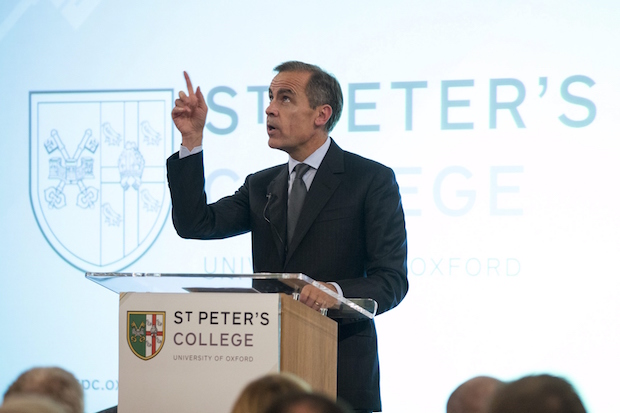Governor Mark Carney is no orator, and whoever puts the fancy metaphors into his speech drafts really ought to desist. In his Mansion House address in June, it was about the legacy of the Great Fire and subsequent rebuilding — just like the great financial crisis, obviously. In last night¹s Cairncross Lecture at Oxford, it was the construction of the Sheldonian Theatre and the strengths of Wren’s design supporting the art on the ceiling — just like the architecture of the European single market, except that ‘they may in time need to be buttressed to realise the full creative potential of the peoples of the UK and Europe’.
On both occasions, Carney looked briefly baffled by his own material. He should stick to plain monetary economics, which he does in authoritative and frankly boring tones. And he should stay right away from the politics of the EU referendum, because otherwise he will walk straight into a storm.
He knows that, of course, and declared (twice) that last night’s speech should not be read as a weighing up of the pros and cons of UK membership. He did however make one strikingly positive statement: that ‘in some respects the UK is the leading beneficiary of the famous “Four Freedoms”: the free movement of goods and services, capital and labour’. But it would be astonishing if this international technocrat and expert on financial stability was anything other than privately inclined towards staying in — a vote to come out, whatever its long-term advantages, being a recipe for wild uncertainty and turbulence for the remainder of his term as governor.
So the speech was no more than a mild hint in that direction, hedged with conditions and ambiguities. More important were the passages about the quality of EU financial regulation as it affects London, and the threat to non-Eurozone EU members from any botched steps towards further integration of the Eurozone: ‘The future direction of EU financial reform should recognise that the EU comprises multiple currencies with multiple risks’.
The speech was hyped by the media as an intervention in the in-out debate, but was really an exhortation to Brussels to stop doing things that might be harmful to UK interests. Some hope, ‘Out’ campaigners will say; but what they can’t say is that they have unequivocally enlisted the Governor.







Comments